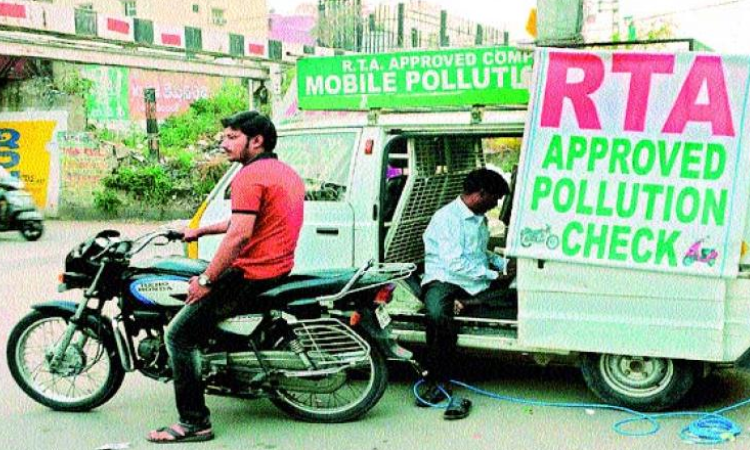
I. No pollution papers? Can’t claim insurance(Source: Deccan Chronicle)
Insurance claims will not be paid for any accident if the PUC certificate is found to be invalid on the day of the accident.
The General Insurance Council will soon draft a clause to be added to the insurance policy document that will say that if the PUC certificate is not available at the time of the accident, the policy will not be paid.
Pollution under Control (PUC) certificate will soon be made a mandatory document to make an insurance claim, as per an order of the Supreme Court.
Vehicle insurance claims will not be paid for any accident if the PUC certificate is found to be invalid on the day of the accident.
Insurance companies have not made any changes to the systems yet and so far if customers renew car insurance online, they are not being asked for a PUC certificate.
The General Insurance Council will soon draft a clause to be added to the insurance policy document that will say that if the PUC certificate is not available at the time of the accident, the policy will not be paid.
The Insurance Regulatory and Development Authority (IRDA) has instructed insurance companies to not to give vehicle insurance policies without the PUC certificate. Insurance companies have a hard time to identify and verify the PUC certificates as they do not have a centralised database that includes PUC certificates.
Meanwhile, insurance companies argue that enforcing PUC certificates should be done by the Road Transportation Authority (RTA) and should not be imposed through them.
II. How India’s proposed data privacy bill compares with protection laws across the world
India’s draft of the Personal Data Protection Bill, 2018, provides for regulations of user’s personal data that is collected by various third parties, including the state.
In a digital economy abounding with platforms such as Facebook, Google and widening use of the Internet, privacy and security of people’s data have become a key public concern and a defining public policy debate.
India moved closer to its first data privacy law on Friday after a committee, headed by former Supreme Court judge BN Srikrishna, proposed a draft Personal Data Protection Bill.
The draft bill provides for the formation of a Data Protection Authority of India to protect citizen’s data and privacy a growing concern in an increasingly digitising economy.
The proposed bill makes individual consent the centrepiece of data sharing, awards rights to users, imposes obligations on “data fiduciaries” all those entities, including the State, which determine purpose and means of data processing.
It also lays out provisions on data storage, making it mandatory for a copy of personal data to be stored in India, and called for amendments to other laws, including the Right to Information. Though the bill does not mention it directly, the report also suggests changes to the Aadhaar Act.
In essence, the Data Protection Authority will function as India’s privacy regulator.
Several countries across the world have already implemented similar data protection laws. The focus on users right to their data and its protection comes after the scandal this March over access gained by political marketing firm Cambridge Analytica to data collected through Facebook.
III. Bill introduced in Lok Sabha to change classification of MSMEs
A bill was introduced in the Lok Sabha on Monday seeking to change the classification of Micro, Small and Medium Enterprises (MSMEs) from that based on "investment in plant and machinery/equipment" to "annual turnover".

A bill was introduced in the Lok Sabha on Monday seeking to change the classification of Micro, Small and Medium Enterprises (MSMEs) from that based on "investment in plant and machinery/equipment" to "annual turnover".
The Micro, Small and Medium Enterprises Development (Amendment) Bill, 2018, introduced by Micro, Small and Medium Enterprises Minister Giriraj Singh, seeks to amend Section 7 of the 2006 to provide for micro enterprise to be defined as a unit where the annual turnover does not exceed Rs 5 crore.
A small enterprise will be defined as a unit with turnover of more than Rs 5 crore and up to Rs 75 crore and a medium enterprise will be a unit with annual turnover of more than Rs 75 crore but not more than Rs 250 crore.
The new bill was introduced after the minister took consent of the house to withdraw The Micro, Small and Medium Enterprises Development (Amendment) Bill, 2015.
Hope you enjoyed reading this publication
Disclaimer:
The views of the authors/publishers should not be construed as advice. Investors must make their own investment decisions based on their specific investment objectives and financial positions and using qualified advisors as may be necessary. Opinions expressed in various articles are not necessarily those of Wealthmax Enterprises Management Private Limited(WEMPL) or any of its directors, officers, employees and personnel. Consequently, WEMPL or any of its directors, officers, employees and personnel do not accept any responsibility for the editorial content or its accuracy, completeness or reliability and hereby disclaim any liability with regard to the same. Stock picks and mutual fund snapshots are not exhaustive and should not be construed as recommendations.
